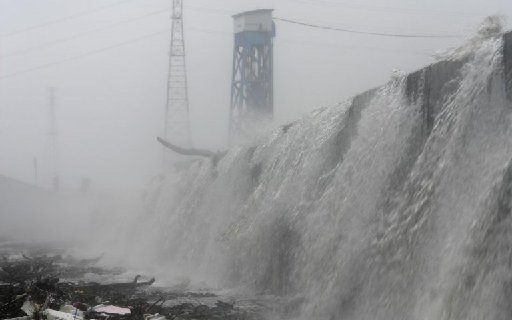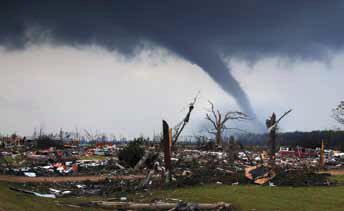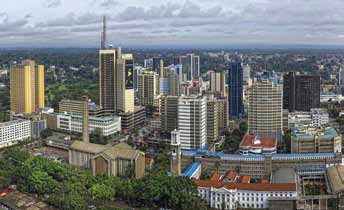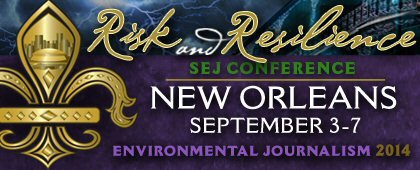Journalists are eligible for free email subscriptions to SEJournal, including TipSheet, WatchDog (on access issues) and more.
All-Day Workshops
Opening Reception
SEJ Awards
| Agenda | Coverage | Lodging/ Travel | Advertise/ Exhibit | Environmental News | About New Orleans |
Wednesday, September 3, 2014
SEJ’s 2014 annual conference officially begins Wednesday afternoon, Sept. 3, with our opening reception, followed by dinner, special welcomes and surprise guests, and SEJ’s awards program.
Before the official beginning, we offer these two all-day workshops below.
All sessions, as well as registration, exhibits and breaks, will be at the Hilton New Orleans Riverside,
Two Poydras Street, New Orleans, Louisiana 70130, (504) 561-0500, unless otherwise indicated.
Note: All information is subject to change. Please check back often for updates and information on event times, speakers, etc.
All-Day Workshop 1
Disasters and Extreme Weather: Gathering the News and Keeping Safe
7:30 a.m. - 4:30 p.m.
Location: Rosedown, 3rd Floor
 |
|
Seawater surges over the Industrial Canal floodwall during Hurricane Gustav in 2008. © Photo courtesy NOLA.com | The Times-Picayune |
Disasters challenge even the best reporters. Events are chaotic, answers are hard to come by, and sources are obscured by bureaucracies. Still, the demand for news is insatiable. How can we hit the ground running? Veteran reporters and freelancers share their experience and advice, while first responders explain how and why government functions the way it does. Sessions will cover industrial infrastructure; sourcing; protecting our own psyche; and the common classes of contaminants. We’ll examine industrial disasters and extreme weather at home and overseas, with help from international journalists. SEJ members only. Pre-registration and $70 fee required. Breakfast and lunch included.
- Disaster resources list by Bill Kovarik.
- Disaster content on SEJ.org.
Draft Agenda:
7:30 a.m. Breakfast Served. Find a seat.
8:00 a.m. General Overview and Introduction of Participants
8:30 - 9:30 a.m.
Disasters: The Science — Contaminants in the Environment
What are the general classes of contaminants, how do they behave in the environment, how are they contained/cleaned up? Learn how to find independent sources of scientific information on contaminants and learn where to look for information on weather patterns that affect the spread of contaminants. Conclude with an inside look at spills and cleanups, using the Deepwater Horizon as an example. Coverage.
Moderator: Bill Kovarik, Professor of Communication, Unity College
Speakers:
Ken Graham, Meteorologist-in-Charge, New Orleans/Baton Rouge Office, National Weather Service, National Oceanic and Atmospheric Administration
Charlie Henry, Director, Disaster Response Center (Mobile, AL), National Oceanic and Atmospheric Administration and Lead Scientific Support Coordinator, Deepwater Horizon Oil Spill
Wilma Subra, Environmental Scientist; President, Subra Company; Vice-Chair, National Advisory Council for Environmental Policy and Technology, U.S. Environmental Protection Agency; Member, U.S. EPA National Environmental Justice Advisory Council; and Recipient, MacArthur Fellowship Genius Award
Mark Sullivan, Director of Communications, Entergy Nuclear
9:30 - 9:45 a.m. Break
9:45 - 10:30 a.m.
Disasters: The Craft — Getting the Story
When the call comes, a journalist must get to the truth in nearly real-time. How can this be done when even official sources don't know yet what happened, or aren't particularly helpful; or when social media and bad reporting are spreading rumors and nonsense that, inevitably, your editors seize upon? At the same time, how can a journalist establish a unique niche in the first 48 hours? Two longtime EPA public-affairs officials — one deeply involved in forming crisis communication procedures and the other a former emergency response supervisor — talk about what happens on the inside and answer journalists' questions about access and information. A veteran disaster reporter discusses getting around official and unofficial roadblocks with accuracy and speed. Coverage.
Moderator: Randy Lee Loftis, Environmental Writer, The Dallas Morning News
Speakers:
Nancy Grantham, Director, Office of Public Affairs, Region 1, U.S. Environmental Protection Agency (replaced by Mark MacIntyre, Public Affairs Specialist, Region 10 Seattle)
David Gray, Director, Office of Public Affairs, Region 6, U.S. Environmental Protection Agency and former EPA On-Scene Coordinator
10:30 - 11:45 a.m. Open discussion. All speakers participate in a free-ranging discussion and question-and-answer session.
Noon - 1:15 p.m. Lunch
Aftershocks: Trauma, Climate Change and Environmental Journalism
From its earliest roots in the reporting of Rachel Carson and other pioneers, environmental journalism has shed light on the overlooked victims of ecological catastrophe. What do today's environmental reporters need to know about the new science of trauma, psychological injury and resilience — how the individuals, families and communities we cover are changed in enduring ways by overwhelming events? Are environmental journalists in all media vulnerable to psychological injury from covering today's most urgent environmental crises, and what do we know about trauma and resilience in news professionals? Join us for a discussion linking trauma and environmental science, journalism craft and strategies for practical self-care. Coverage.
Resources:
- "10 Tips To Cover Natural Disasters," by Michael Casey.
- "Failure of Tsunami Reconstruction Leaves Humanitarian Agencies Under Fire," The Associated Press, September 24, 2006, by Michael Casey.
- "Tsunami's Environmental Wreckage Still Huge, But Human Impact Is Even Bigger," The Associated Press, December 21, 2005, by Michael Casey.
- "Tsunami Prompts Companies To Play Greater Role in Humanitarian Relief," The Associated Press, June 24, 2005, by Michael Casey.
- "Muslims, Christians Battle for Souls on Sumatra Island in Wake of Tsunami," The Associated Press, January 13, 2005, by Michael Casey.
Moderator: Mike Casey, Reporter, Fortune and former Reporter, Asia and the Middle East, The Associated Press
Speaker: Bruce Shapiro, Executive Director, Dart Center for Journalism and Trauma, Columbia University; Contributing Editor, The Nation; U.S. Correspondent for Late Night Live, Radio National, Australian Broadcasting Corporation
1:15 - 1:30 p.m. Break
1:30 - 2:45 p.m.
The Essential Toolkit for Reporting During a Disaster
What do you need to know before you go into the field? What must-haves should you be sure to bring with you? In this session, panelists and the audience will have an interactive discussion on how to develop contact lists, prepare credentials ahead of time, pitch and market stories, set pay rates, and more. Coverage.
Moderator: Emily Gertz, Freelance Journalist and Editor
Speakers:
Scott Dodd, Editorial Director, Natural Resources Defense Council
James Schwab, Manager, Hazards Planning Research Center, American Planning Association, and Senior Research Associate and Co-Editor, Zoning Practice, American Planning Association
2:45 - 3:00 p.m. Break
 3:00 - 4:30 p.m.
3:00 - 4:30 p.m.
Disasters Know No Borders
The devastation wrought by natural disasters in developing countries can be so overwhelming it defies description. But today we are immediately connected to faraway catastrophes, and the global conversation about them can change the political agenda. How can U.S. reporters accurately convey both the on-the-ground reality of these events and report the ripple effects in their own regions? How do reporters based in vulnerable countries approach disaster reporting, and what unique challenges do they face? A group of international journalists will join the conversation as speakers share lessons learned from covering last year's Typhoon Haiyan and tips for covering the upcoming 10th anniversary of the Indian Ocean tsunami.
Moderator: Meaghan Parker, Writer/Editor, Environmental Change and Security Program, Wilson Center
Speakers:
Imelda Abano, President, Philippine Network of Environmental Journalists
Winifred Bird, Freelance Journalist
Mike Casey, Reporter, Fortune and former Reporter, Asia and the Middle East, The Associated Press
All-Day Workshop 2
From Nairobi to New Orleans: Reporting on Resilience, Climate Change and Population Dynamics
9:00 a.m. - 4:30 p.m.
Location: Oak Alley, 3rd Floor
All conference attendees are welcome to attend this workshop sponsored by the Woodrow Wilson International Center for Scholars. Breakfast and lunch are included. RSVP is required: please respond directly to Meaghan Parker to attend.
Across the globe, from megacities to small coastal communities, people are confronting the coming challenges of climate change. These changes, both rapid and slow, are putting more people at risk than ever before as urban and coastal areas grow. From villages in the Philippines to UN forums, the calls for increasing the resilience for the most vulnerable people are deafening. But reporting on resilience requires pushing the boundaries of the traditional environmental beat and looking beyond national borders. This workshop of reporters and experts from Africa, Asia, and the United States will share story tips, demonstrate data tools, and compare cross-border approaches to reporting on resilience, climate, and population dynamics. Coverage.
Draft Agenda:
9:00 a.m. Breakfast Served
9:15 a.m. Welcome and Introductions
 9:45 - 11:00 a.m.
9:45 - 11:00 a.m.
Risky Cities and Resilient Communities
What makes a community resilient? We’ll discuss the complex connections between climate change and population dynamics, including urbanization, migration, gender and health, and how to turn this complexity into compelling stories about cities around the world. Coverage.
Moderator: Adam Glenn, Educator, Graduate School of Journalism, City University of New York; Digital Media Consultant, a2g Media; Editor, SEJournal, Society of Environmental Journalists; Editor, AdaptNY
Speakers:
Roger-Mark De Souza, Director of Population, Environmental Security, and Resilience, Woodrow Wilson Center
Joan Erakit, Writer and Journalist
Ken Weiss, Grantee, Pulitzer Center on Crisis Reporting and former Reporter, Los Angeles Times
11:00 a.m. - 12:15 p.m.
Big Questions Need Big Data: Population and Climate
Experts will demonstrate new tools for understanding how population dynamics affect climate change predictions, and how to measure and model resilience at local, national, and international levels.
Moderator: Lisa Palmer, Freelance Reporter and Editor
Speakers:
William Butz, Senior Research Scientist, International Institute for Applied Systems Analysis
Joyce Coffee, Managing Director, Notre Dame Global Adaptation Index
Kathleen Mogelgaard, KAM Consulting
12:15 - 1:30 p.m. Lunch Discussion
 1:30 - 3:00 p.m.
1:30 - 3:00 p.m.
Storytelling in the Anthropocene: Picturing People and the Planet
Visual media — film, video, and photography — have proven especially powerful for conveying people’s lived experience and their capacity for resilience in the face of change. Videographers and photographers will share some clips from their work documenting the connections between climate, population, and human rights.
Moderator: Rhitu Chatterjee, Contributing Correspondent, PRI’s The World
Speakers:
Gladys Kalibbala, Features Writer, New Vision (Uganda)
Sean Peoples, Multimedia Editor and Program Associate, Environmental Change and Security Program, Woodrow Wilson Center
Steve Sapienza, Senior Producer, Pulitzer Center on Crisis Reporting
3:00 - 4:30 p.m.
Disasters Know No Borders
Join "Disasters and Extreme Weather" workshop's 3:00 p.m. session above.
Registration
2:00 - 6:00 p.m.
Location: 1st Floor Registration Counters (across from escalators in the conference area)
If you didn't sign up ahead of time for a Thursday tour, the Saturday night party, or Sunday breakfast at the Audubon Zoo, there may still be room — please check with registration.
SEJ Information Table
2:00 - 5:00 p.m.
Location: Next to registration
Sign up here for Mini-tours and Beat Dinners. Read up on SEJ Board candidates, and find information about SEJ Award winners, membership and services. Pick up copies of SEJournal and other SEJ information.
Opening Reception, Dinner and Awards
5:00 - 9:00 p.m.
Location: Napoleon Ballroom, 3rd Floor
 It's New Orleans, folks, so the bar will open early, the music will be playing, and everyone will be able to share their "where y'at" stories. Look for a Katrina retrospective — 2015 will mark the ten-year anniversary — and media perspective from Jim Amoss, editor in chief of NOLA.com | The Times-Picayune.
It's New Orleans, folks, so the bar will open early, the music will be playing, and everyone will be able to share their "where y'at" stories. Look for a Katrina retrospective — 2015 will mark the ten-year anniversary — and media perspective from Jim Amoss, editor in chief of NOLA.com | The Times-Picayune.
We'll hear progress reports on recovery of the Gulf four years after the Deepwater Horizon oil spill from Geoff Morrell, senior vice president of U.S. Communications and External Affairs for BP, with equal time for questions. Actors, musicians and others with ties to New Orleans will add their voices and stories to the mix, along with Michael Blum, director of the Tulane/Xavier Center for Bioenvironmental Research, who's been tracking effects of the spill. Best of all, we'll celebrate the year's best reporting and photojournalism on the environment — great work that's changing the world, one story, one photo, one book at a time. Coverage.
Emcees:
Conference Chair Mark Schleifstein, Environment Reporter, NOLA.com | The Times-Picayune
Natalie Allen, International Anchor and Environmental Correspondent, CNN
Jeff Burnside, Senior Investigative Reporter, KOMO 4 News, Seattle
Thursday, September 4
Friday, September 5
Saturday, September 6
Sunday, September 7










 Advertisement
Advertisement 



